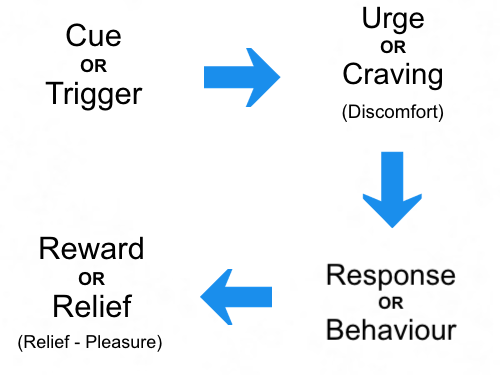Forming Partnerships to Support Improved 'Whole Health'
Addiction; What is it, and How it is

The word ‘Addiction’ is derived from a Latin term for ‘enslaved by’ or ‘bound to’. Anyone who has struggled to overcome an addiction or has tried to help someone suffering from Addiction will understand this.
Addiction exerts a powerful and enduring influence on brain function that manifests in three distinct ways:
• Strong urges (craving) to engage in the behaviour
• Loss of control over engagement in the behaviour
• Continuing involvement despite adverse
consequences.
Addiction is not limited to Alcohol and Drug problems. Addiction can manifest relating to any behaviour that is driven by reward through increasing activity in the reward pathway of the brain, Gambling, Internet, Pornography and Gaming to name a few.
Addiction is a word that over time has been used to describe many and varied, shall we say seemingly impulsive, compulsive, and obsessive behaviours. Addiction related problems can often co-exist with other mental health problems, where many individuals fall into Addiction through ‘self-medicating or feel good’ behaviour. The psychological consequences of Addiction can also mimic other mental health problems, often leaving the afflicted individual chasing remedies for the consequences, rather than concurrently addressing the underlying problem.
Addiction and the Brain:
Any substance or behaviour that we can become addicted to, as mentioned, must through some course of action, increase the availability of dopamine (our feel-good neurotransmitter) in the reward pathway of the brain. Our current understandings also tell us that dopamine interacts with other neurotransmitters, to significantly influence the brain's system of reward-related learning. The reward system has an important role for us, as it links behaviour needed for human survival (such as eating and sex) with pleasure and reward. This action motivates and sustains behaviour required for our survival.
The brains reward pathway is the system for motivating behaviours. It is then the nature of the brain to motivate pleasurable behaviours, unfortunately this powerful motivational force does not have the ability to associate harmful effects with a behaviour. As nature has designed this brain function, we are all vulnerable whether through the hyper-stimulation of Alcohol and Drugs or pleasurable behaviours to developing Addiction.
The reward pathway in the brain also includes memory functions, associating behaviour and processes with pleasure. The learning process mentioned earlier also strongly comes into play in Addiction. Information (memory) relating to all environmental and emotional cues associated with the addictive behaviour are stored away and promote a strong conditioned response.

Whenever a person encounters those environmental or emotional cues this process strongly motivates us to take action in seeking out the source of pleasure.
What does all this mean, simply we could say that the brain is doing as it is designed to do, and the manifestation of Addiction is a combination of biological, psychological, social and environmental influences. Engagement initially in what ever the behaviour related to the addiction may be, was a choice. However, this high-jacking and adaption of the brain that now drives the Addiction is not, the power of choice has been lost.
Personal acceptance regarding the Addiction can be a significant barrier to change. Often the reward pathways actions are inhibitive to consequential thinking and reward out-ways any ‘beliefs’ associated to the direct harmful impacts of Addiction. It seems to be the rule rather than the exception that it is those people around us that notice the problem and attempt to bring it to attention. A word of advice ‘listen’.
A term often used to describe this phenomenon is denial. More accurately termed from my experience, it is the manifestation of the biological, psychological, and social consequences of Addiction. No body generally wants their life to be this way, Addiction related behaviour is often incongruent to personal values thus causing shame, the most uncomfortable and isolating emotion of our rich emotional experience. A consequence of this, is that often the addict isolates themselves from those who love and care for them in an attempt to avoid shame. Isolation and disconnection are strong maintaining factors in the Addiction, allowing it to continue in its progressive and destructive course.
Warning Signs of Addiction:
- Obsessional thoughts relating to the behaviour
- Continuing the behaviour despite negative consequences, exposure to risky situations, and not completing responsibilities
- Inability to stop despite having a desire to
- Cessation of the behaviour causes strong urges (craving) to engage in the behaviour
- Irritability, restlessness, and low mood
- Isolating and lack of acceptance of issues resulting from the behaviour
- Concealment of the behaviour from family and friends
- Stopping activities and hobbies that were once pleasurable
Addiction if left to run its progressive and destructive course ruins people’s lives, not only the individual suffering the Addiction, also those people who love and care for them.
Capri Sanctuary provides an environment that has a focus on our Guest’s ‘Wellbeing’. Our clinical programme is evidence-informed and underpinned by our philosophy based in ‘Transformation through Partnership and Relationship’. It is delivered to you by our highly qualified and experienced team and directed to meet our Guest’s specific individual needs.
Effective Treatment is Simply Effective: It Works!
Capri Sanctuary 2018
